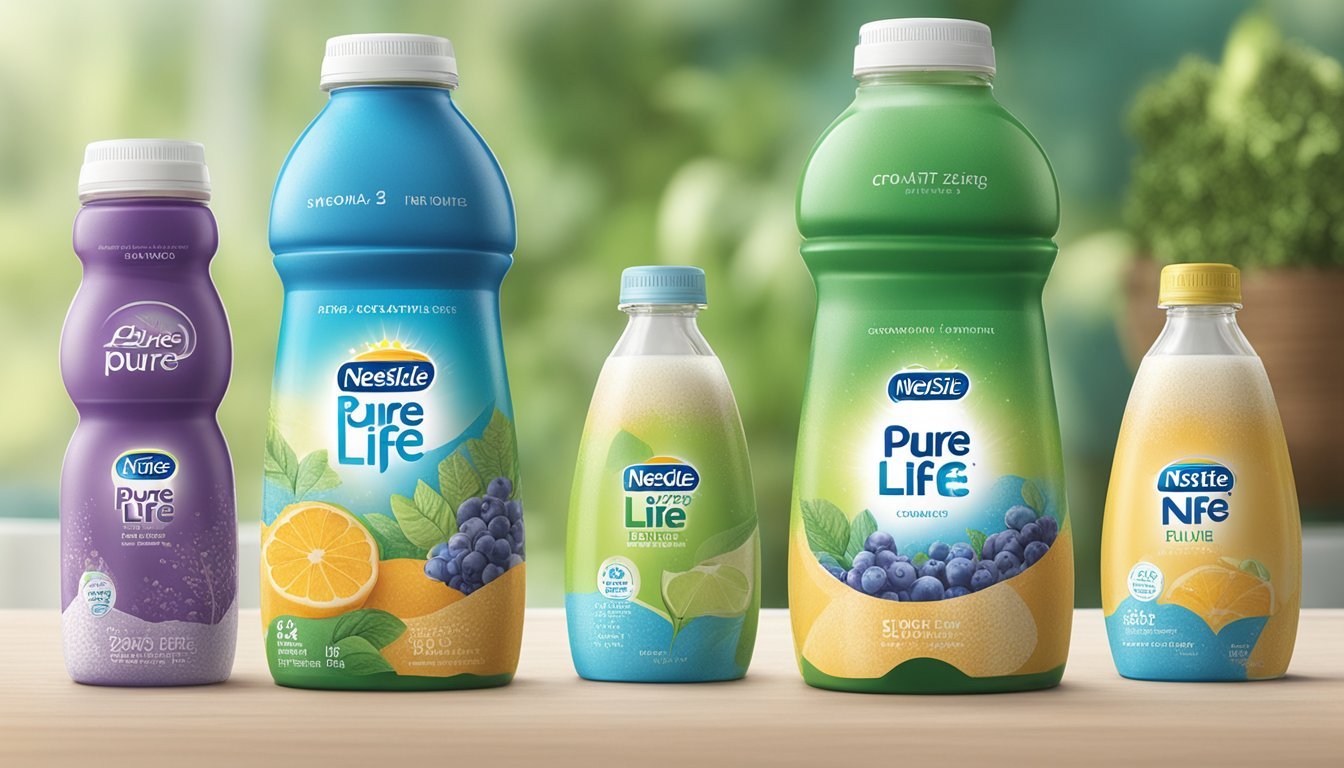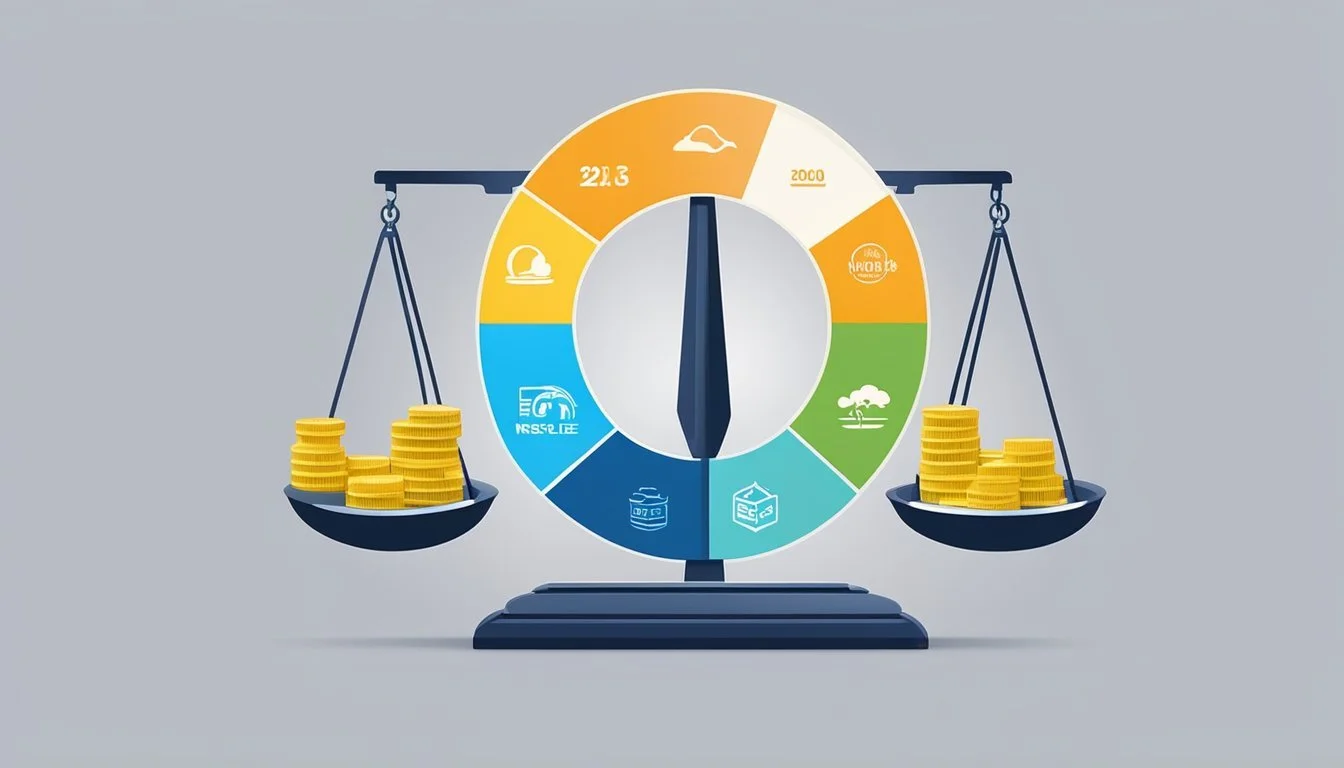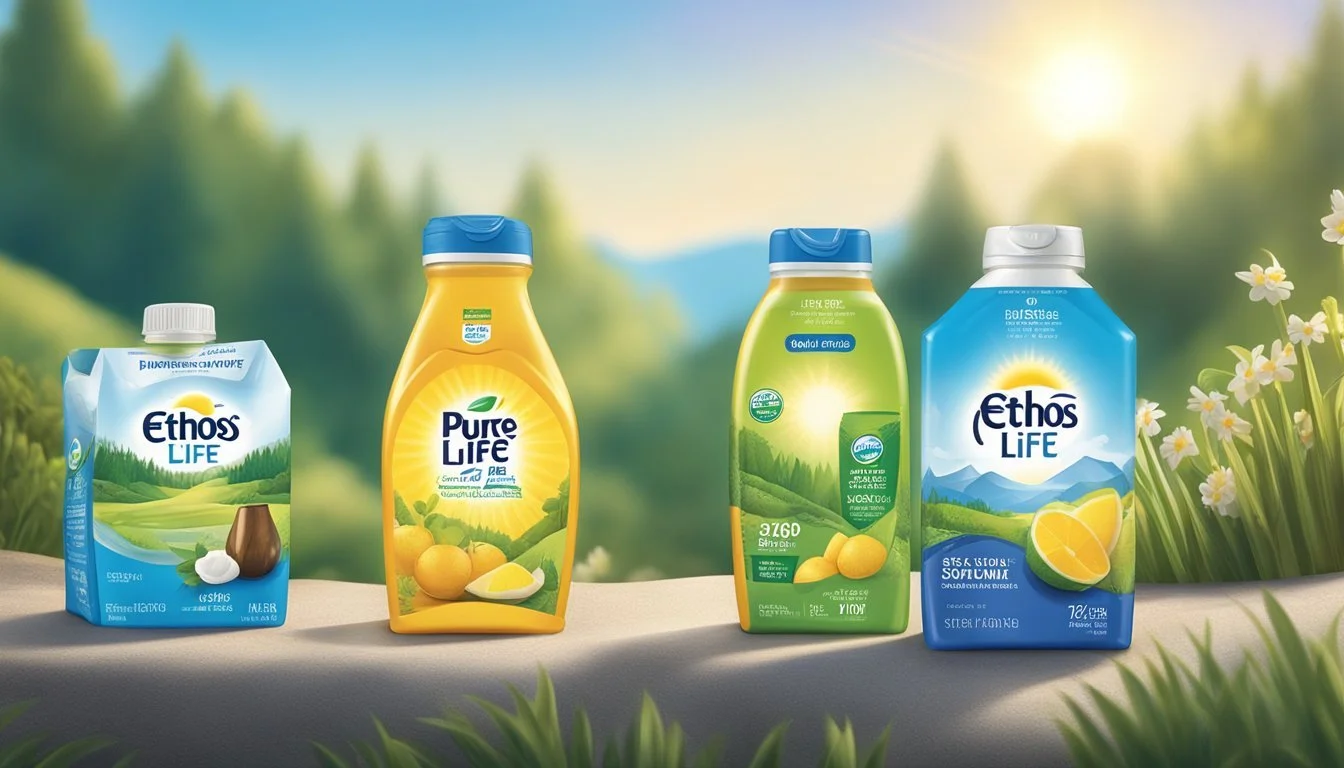Ethos vs. Nestlé Pure Life
A Comparative Analysis of Bottled Water Brands
Water is essential to life, and the choices available in the bottled water market reflect a spectrum of taste, quality, and origins. In this crowded field, Ethos Water and Nestlé Pure Life stand out as prominent options. Ethos, known for its commitment to social causes, pledges to help children get access to clean water with every bottle sold. Meanwhile, Nestlé Pure Life, one of the most widely distributed bottled water brands, positions itself as a healthy hydration choice, available in numerous regions around the globe.
The debate over which bottled water is superior is multifaceted, spanning taste, source, purification processes, and brand ethos. Ethos Water sources its product from various springs and aims to offer not just refreshment but also a way for consumers to contribute to a greater good. Conversely, Nestlé Pure Life, associated with the world's largest food and beverage company, delivers a product that undergoes a rigorous multi-step purification process. It's a brand many households recognize, with wide accessibility being one of its strengths.
Seeking to determine the better option between Ethos and Nestlé Pure Life involves examining a variety of factors, from environmental impact and corporate responsibility to the actual product the consumer receives. This analysis aims to shed light on these aspects, assisting consumers in making an informed choice on which bottled water aligns best with their values and preferences.
Comparative Overview of Ethos and Nestlé Pure Life
Ethos Water and Nestlé Pure Life are two bottled water brands that have significant market presence. Ethos Water places a strong emphasis on social responsibility. For every bottle sold, the company pledges to contribute a portion of the profits to water access initiatives across the world. This commitment is tied to the brand's mission of addressing the global water crisis.
In contrast, Nestlé Pure Life is marketed by Nestlé Waters and is one of the largest bottled water brands globally. It is known for its rigorous quality assurance practices and is available in more than 40 countries. Nestlé Pure Life underwent a brand refresh that included a focus on reducing its PET (polyethylene terephthalate) bottle consumption, reflecting a response to environmental concerns.
From a product source standpoint, Ethos Water is primarily sourced from springs and purified through a multi-step process. On the other hand, Nestlé Pure Life's water sources vary, with some sourced from springs and others from public water supplies followed by purification.
Ethos Water:
Focus on social impact
Contributes to water access projects
Sourced from springs
Noted for social entrepreneurial model
Nestlé Pure Life:
Emphasis on quality and accessibility
Focused on reducing environmental impact
Sources vary, including springs and public supplies
Broad international availability
Both brands are accessible in the United States, with Nestlé Pure Life having a more pronounced presence due to its scale and distribution networks. Ethos Water's availability is typically associated with Starbucks, as it was acquired by the coffee giant, which plays a significant role in its marketing and distribution.
Quality and Source Analysis
In comparing Ethos Water and Nestlé Pure Life, the analysis focuses on their origins, taste differences, and mineral content to determine which bottled water presents a better option for consumers.
Assessment of Water Sources
Ethos Water is known for sourcing its water mainly from springs, striving to provide customers with a taste that reflects natural water sources. On the other hand, Nestlé Pure Life sources its water from protected underground sources, with some of its range also including water sourced from well or municipal supplies. The variations in the water source can significantly impact the final purity and quality of the bottled water.
Ethos Water: Mountain spring water or natural springs
Nestlé Pure Life: Groundwater or municipal water (with additional purification steps)
Difference in Taste Profiles
The taste of bottled waters is heavily influenced by their source and purification process. Spring water, such as Ethos Water, typically has a fresh and light taste due to its journey through mineral-rich pathways. Nestlé Pure Life, in its quest to ensure consistent taste across its products, goes through a rigorous multi-step filtration process that includes demineralization and remineralization, which can result in a more controlled but bland flavor profile.
Ethos Water: Fresh, light, variable with source
Nestlé Pure Life: Consistent, often neutral
Mineral Content and Health Benefits
Minerals are a key element in determining the health benefits of bottled waters. The mineral content of water impacts not just health benefits but also the mouthfeel of the water.
Ethos Water often retains a higher mineral content due to less intensive filtration, which can also lend to health benefits associated with naturally occurring minerals.
Nestlé Pure Life, though, ensures its water is safe and clean through advanced filtration, and then it adds back a consistent blend of minerals for taste. This process may not provide as diverse a mineral profile as natural water sources but does offer the advantage of eliminating potential contaminants.
Mineral Content Ethos Water Nestlé Pure Life Calcium Varied levels, from natural sources Added during remineralization process Magnesium Naturally occurring, levels vary Controlled levels, added for consistency Sodium Naturally present, quantity varies Reduced through processing, then added
In summary, the quality and source of the bottled water from Ethos and Nestlé Pure Life exhibit distinct characteristics that are a reflection of their source and processing methods.
Environmental Impact and Sustainability
The environmental considerations of bottled water production are paramount in evaluating brands like Ethos and Nestlé Pure Life. This section provides insight into their production processes, recycling programs, and specific sustainability initiatives.
Bottled Water Production
Bottled water companies impact the environment starting from the extraction of water to the production of the packaging materials. Ethos Water prides itself on partnering with community water programs, although specifics on its bottling processes are less publicized. In contrast, Nestlé Pure Life acknowledges the environmental footprint of their operations and has shown a commitment to making improvements, such as reducing the amount of plastic in their bottles.
Energy Consumption: Bottling water, especially in single-use containers, involves significant energy, largely due to the material production and transportation required.
Resource Use: The water sourcing itself can be a point of contention, as over-extraction can lead to depletion of local water resources.
Recycling and Waste Management
Recycling and waste reduction are critical in mitigating the environmental impact of bottled water.
Nestlé Pure Life bottles are fully recyclable, and the brand has taken steps to introduce bottles made from other recycled bottles, attempting to set a circular precedent in the industry.
Ethos Water does not provide extensive details on their recycling efforts, but they employ lightweight PET plastic in their bottles, which is a commonly recyclable material.
Recyclability does not ensure bottles are recycled, and actual rates of recycling can be low, with many bottles ending up in landfills or as litter.
Ethos and Nestlé Environmental Initiatives
Both companies have established different environmental strategies:
Ethos Water contributes to global water access initiatives, with a focus on supporting water, sanitation, and hygiene education in developing countries. A portion of their profits is earmarked for these efforts.
Nestlé Pure Life has outlined goals to improve water efficiency and sustainability in their operations. Future commitments include site certification by the Alliance for Water Stewardship (AWS) and increased use of recycled plastics.
Safety and Contamination Concerns
In examining bottled water brands Ethos and Nestlé Pure Life, it is crucial to consider the safety and contamination issues that may impact consumer health.
Federal Regulations and Compliance
Ethos and Nestlé Pure Life must adhere to safety standards set by the Food and Drug Administration (FDA). This includes regulations on contaminants such as lead, heavy metals, and arsenic. The FDA ensures bottled water does not exceed set Maximum Contaminant Levels (MCLs) for these harmful substances. For instance, the FDA's lead limit for bottled water is three times stricter than the Environmental Protection Agency's (EPA) lead standard for tap water.
FDA MCL for Lead: 5 parts per billion (ppb)
FDA MCL for Arsenic: 10 ppb
FDA MCL for Mercury: 2 ppb
Compliance with these standards is mandatory for both local and imported bottled water.
Detection of Contaminants and Impurities
Detection of contaminants such as PFAS chemicals, BPA, and other impurities is an ongoing concern. PFAS (per- and polyfluoroalkyl substances), which may be present due to industrial and consumer product waste, are detected using advanced laboratory testing. Bottles made with BPA (Bisphenol A) can potentially leach this industrial chemical into the water, thus, many companies now use BPA-free packaging.
Known impacts of PFAS: Negative long-term health effects.
Implications of BPA exposure: Possible connection to health issues, including hormone disruption and heart complications.
Both Ethos and Nestlé Pure Life, like all bottled water brands, are responsible for conducting rigorous testing to ensure safety from these contaminants.
Branding and Market Position
In the landscape of bottled water, branding and market position play crucial roles in consumer choices. Both Ethos and Nestlé Pure Life have established themselves as recognized names, employing distinctive marketing strategies to gain a competitive edge in the industry.
Consumer Perception and Brand Reputation
Ethos Water, with its philanthropic angle, attracts consumers who seek to make a positive impact. A portion of Ethos Water sales goes to support water, sanitation, and hygiene education programs in developing countries, which bolsters its reputation as a brand that cares about global issues.
On the other hand, Nestlé Pure Life is known for its widespread availability and as a national brand, Nestlé has a significant presence in the bottled water market. Despite facing criticism over sourcing practices, it maintains a strong consumer base due to its affordability and wide distribution.
Ethos Water:
Purpose-driven Branding: Public perception is largely positive due to its social mission.
Ethical Edge: Often chosen by consumers looking to contribute to social causes through their purchases.
Nestlé Pure Life:
Market Presence: It is one of the world's largest bottled water brands, with extensive distribution networks.
Brand Challenges: Has faced some negative consumer perception over environmental and sourcing concerns.
Advertising Strategies and Marketing Techniques
Ethos directs much of its advertising effort towards highlighting the brand's charitable commitments, thereby appealing to a consumer base that is more socially and ethically conscious. Its marketing techniques rely heavily on its partnership with Starbucks, which gives it heightened visibility among coffee shop patrons.
Nestlé Pure Life employs a range of advertising strategies aimed at promoting the purity and health benefits of their water. Their marketing efforts often include traditional advertising techniques such as TV commercials and labels that emphasize the quality of the product, aiming to enhance their market position as a healthful choice.
Ethos Water:
Partnerships: Leveraging Starbucks' vast retail presence for increased visibility.
Social Mission in Marketing: Focused campaigns around water initiative stories to engage an empathetic audience.
Nestlé Pure Life:
Diverse Advertising Mediums: Utilizes a broad range of advertising platforms, from television to online ads.
Health-Oriented Branding: Labels and advertisements highlight the safety and health aspect of the water.
Taste and Texture Examination
In the realm of bottled water, the nuances of taste and texture are pivotal for consumer preference. This section dissects the sensory experience associated with Ethos and Nestlé Pure Life waters, analyzing palate preferences and the influences of alkalinity and acidity.
Analyzing Palate Preferences
Ethos Water prides itself on a taste that is often described as clean and pure, which can be appealing to those who favor a more natural flavor profile. In contrast, Nestlé Pure Life is purified water with a blend of minerals added for taste. Consequently, some consumers might find Nestlé Pure Life to have a slightly more pronounced mineral taste compared to the subtle simplicity of Ethos.
Alkalinity and Acidity Influences
Other bottled waters such as Fiji, Voss, and Evian have established reputations for their distinctive mineral content and ensuing taste, often falling on the more alkaline side of the pH scale. Alkaline water, like Essentia, is deemed to have a smoother and silkier texture, while others, such as Deer Park and Smartwater, manage to maintain neutrality, balancing between alkaline and acidic profiles.
The acidity level in water can affect its crispness and can lead to a slightly tart aftertaste. Nestlé Pure Life, being more neutral, aims for a wide consumer base, avoiding the polarizing edges of the pH spectrum. Ethos, while also maintaining a neutral to mildly alkaline pH, targets consumers who are keen on a balanced yet unmodified taste experience. It’s important to note that personal taste perception will ultimately determine individual preference for either brand.
Packaging and Design Considerations
The packaging and design of bottled water are essential factors that inform consumer choice and impact environmental sustainability. Two critical aspects to consider are the materials and construction of the bottles and the transparency of label information.
Bottle Materials and Construction
The bottles of Ethos and Nestlé Pure Life are especially designed with consumer health and environmental sustainability in mind. Nestlé Pure Life bottles are constructed from food-grade recycled plastic, known as rPET, which aligns with the company's goal to enhance recycling. The brand has announced bottles made from 100% recycled plastic. Ethos Water, while not explicitly detailed in the provided data, also emphasizes using recyclable materials to lessen its ecological footprint. Both brands must ensure their packaging is free from BPA (Bisphenol A), a chemical that can seep into water and is linked to adverse health effects.
Recyclability: Both brands focus on using recyclable materials for their bottles.
BPA-Free: Ensuring consumer safety by avoiding BPA in bottle production.
Label Information and Transparency
Accurate label information is vital for customer trust and brand integrity. Nestlé Pure Life is committed to transparency, disclosing the pH levels and sources of their bottled water. Their labels provide consumers with the information needed to make educated purchases. Similarly, Ethos has a responsibility to clearly indicate its water source and pH level, as this can influence a consumer's decision due to varying preferences for taste and mineral content.
pH Levels: Essential information for customers seeking water with specific alkaline or acidity levels.
Transparency: Labels should clearly state the water source and relevant health and safety information.
Consumer Health and Hydration
The debate between Ethos and Nestlé Pure Life water revolves around their ability to hydrate consumers and the quality of ingredients in each brand. This section examines hydration effectiveness and nutritional content, key factors in determining which bottled water is superior for consumer health.
Hydration Effectiveness
Both Ethos and Nestlé Pure Life are designed to provide hydration. Hydration is the process of replenishing bodily fluids lost through daily activities. Safe and clean drinking water is essential for this purpose. The primary role of bottled water, such as Ethos and Nestlé Pure Life, is to offer convenient and safe drinking options for people on-the-go.
Ethos Water: Offers clean drinking water, which is vital for maintaining hydration levels.
Nestlé Pure Life: Provides purified water with a consistent taste, which encourages regular consumption and hydration.
Nutritional Content and Additives
When examining nutritional content and additives, the difference between these two brands becomes more apparent.
Ethos Water:
Aimed at offering water with minimal processing.
No known additives or artificial components listed.
Nestlé Pure Life:
May include added minerals for taste.
Some sources suggest the inclusion of sodium and other preservatives.
Component Ethos Water Nestlé Pure Life Sodium None listed Present Artificial Additives None listed Possible presence Minerals for Taste None listed Added
The nutritional content and the presence of additives contribute to the quality of the water and its overall effect on hydration and health. Ethos focuses on offering straightforward hydration, while Nestlé Pure Life may alter its product for enhanced taste and extended shelf life.
Economic and Industry Insights
This section analyzes the current economic landscape for bottled water brands such as Ethos and Nestlé Pure Life, focusing on market trends and industry growth potential.
Market Trends and Sales Data
Bottled water sales have experienced fluctuations. In 2008, the industry saw a decline in sales, possibly due to consumers questioning the value proposition of bottled water. Despite this dip, bottled water remains a significant player in the beverage industry. Nestlé Pure Life, for instance, has been pinpointed as a brand with average performance within the market.
Sales Decline: A modest 1% drop in 2008 compared to the previous year's 6% increase.
Industry Resilience: Post-2008 decline, sales gradually rebounded, indicating resilience among consumers.
Table: Bottled Water Sales Trend
Year Sales Percentage Change 2007 +6% 2008 -1%
Potential for Industry Growth
The bottled water industry possesses growth potential, with companies like Nestlé planning to further their sustainability efforts. For instance, Nestlé's commitment to achieving Alliance for Water Stewardship (AWS) certification across all sites by 2025 could foster affirmative consumer perception and drive industry growth.
Sustainability Commitments: Over one-third of Nestlé's 48 sites are currently AWS-certified.
Consumer Perception: Increases in eco-consciousness may impact brand preferences and sales.
From the data, consumer trends and corporate responsibility initiatives are pivotal factors shaping the future of the bottled water industry.
Comparative Analysis of Alternatives
When choosing bottled water, consumers often compare taste, source quality, and brand reputation. This section breaks down the key differences between Ethos and Nestlé Pure Life in the context of their competition and market trends.
Comparison with Other Popular Brands
Ethos Water presents itself as a brand with a conscience, promising to contribute part of its proceeds toward humanitarian water programs. Its comparison with other brands is not just about the water quality but also its ethical stance. Ethos typically sources its water from private springs and its taste is often compared favorably against other brands.
Nestlé Pure Life, while one of the largest bottled water brands globally, often faces criticism due to its source and production practices. It is purified water that comes with added minerals for taste. Despite its average ranking in taste tests, it remains widely accessible and affordable.
Other popular brands in the bottled water market include:
Dasani: Known for being purified and enhanced with minerals, yet it has faced scrutiny over its taste and environmental impact.
Aquafina: Similar to Dasani, this is also purified water with minerals added. It scores low on pH scale indicating some acidity.
Poland Spring: Marketed as 100% natural spring water and generally well-received for its taste.
Mountain Valley Spring Water: Offers spring water in glass bottles, appreciated for its taste and commitment to sustainability.
LIFEWTR: A premium bottled water brand that has a high pH and electrolytes for taste.
CORE Hydration: Nutrient-enhanced water that is also balanced to match your body’s natural pH.
BluTriton: Formerly known as Primo Water, focuses on bulk water solutions and maintains a lower profile in single-serve bottled water.
Boxed Water: Features water in cartons as an eco-friendly alternative to plastic bottles.
According to recent consumer reviews, brands like Fiji Natural Artesian Water are often considered the best-tasting due to their unique mineral profile and source.
Emerging Trends in Bottled Water
The bottled water industry is observing a shift toward eco-friendliness and health-centric products. Boxed Water is part of an eco-conscious trend to move away from single-use plastics, and brands like Mountain Valley Spring Water offer their products in glass to cater to sustainable choices.
Health trends manifest in products like LIFEWTR and CORE Hydration, which emphasize added electrolytes and balanced pH levels, catering to consumers who are not only looking for hydration but also additional health benefits.
As consumers become more environmentally and health-conscious, bottled water brands are adapting, and this informs their competitive edge. Ethos and Nestlé Pure Life must navigate these trends to maintain their relevance and appeal in the evolving bottled water landscape.
Regulatory Compliance and Standards
In the bottled water industry, compliance with regulatory standards is a critical factor that influences consumer trust and product quality. Both Ethos and Nestlé Pure Life take these standards seriously, adhering to FDA regulations while also considering international practices.
Adherence to FDA Regulations
Ethos Water operates within the regulatory framework of the FDA. The FDA's standards for bottled water include compliance with the Federal Food, Drug, and Cosmetic Act (FFDCA) and related regulations, ensuring that bottled water is safe to consume and properly labeled. Ethos must meet these federal requirements to maintain its market presence in the United States.
Nestlé Pure Life, as a product distributed by Nestlé Waters North America, also adheres to the strict guidelines set by the FDA. Regulatory compliance for Nestlé Pure Life involves meeting or exceeding federal standards for contaminants and labeling. Nestlé’s internal quality assurance program exerts additional measures to ensure product safety and quality surpassing the federal government's requirements.
International Standards and Practices
When it comes to international standards, both Ethos Water and Nestlé Pure Life must navigate a variety of regulations, as countries in Europe and elsewhere often have their unique requirements for bottled water.
Ethos Water, affiliated with Starbucks, may be subject to European standards which could include regulations that are distinct from the FDA, as Europe possesses its regulatory entities and guidelines for food and beverage products.
Nestlé Pure Life must comply with multiple international standards and practices, given the global reach of Nestlé Waters North America. Notably, the brand's internal requirements often meet or even exceed local regulatory laws in the countries where the water is distributed, ensuring a uniformly high product quality across different markets.
Technological Advances in Production
The bottled water industry has seen significant improvements in production technology. Two key areas where Ethos Water and Nestlé Pure Life have invested include the enhancement of filtration processes and the development of packaging solutions.
Filtration Processes and Purification
Both Ethos Water and Nestlé Pure Life employ advanced filtration processes to ensure the purity of their products. Ethos uses a reverse osmosis purification system, which involves water being forced through a semi-permeable membrane to remove impurities. In contrast, Nestlé Pure Life utilizes a multi-step process that includes filtration, distillation, and an added blend of minerals for taste.
Ethos Water:
Filtration method: Reverse osmosis
Purification focus: Removal of contaminants
Nestlé Pure Life:
Filtration method: Multi-barrier approach including sand filters, micron filters, carbon filters, and reverse osmosis
Variation: Addition of a unique mineral blend for enhanced taste
Nestlé Pure Life's use of carbon filters effectively removes chlorine and organic compounds, which is crucial for non-carbonated products. The brand does cater to the carbonated water segment, ensuring that any added carbonation does not interfere with the purification process.
Innovations in Packaging
Both brands strive to minimize environmental impact and improve consumer convenience through innovative packaging solutions. Ethos Water takes pride in its use of recycled plastic bottles, while Nestlé Pure Life has made strides in making lighter bottles that use less plastic overall.
Packaging Innovations:
Ethos Water:
Uses RPET (Recycled Polyethylene Terephthalate) bottles
Nestlé Pure Life:
Introduced Eco-Shape bottles, using 30% less plastic than traditional bottles
Ethos's commitment to RPET bottles reflects its broader mission for social and environmental responsibility, though specific technological details are not as widely publicized as Nestlé's efforts. Nestlé's Eco-Shape bottle design not only reduces material usage but also optimizes shipping efficiency, contributing to lower carbon emissions during transportation.
Conclusion
When comparing Ethos and Nestlé Pure Life bottled waters, consumers must consider a range of factors including source, taste, purity, and environmental impact. Ethos Water stands out for its social responsibility initiative, with a portion of its profits supporting water access in developing countries. This commitment adds value for those who prioritize ethical consumption.
On the other hand, Nestlé Pure Life is often critiqued for being just average in taste and purity, according to available rankings. It does offer a neutral pH balance, which may be a deciding factor for consumers seeking a product that is less acidic.
From an environmental standpoint, both brands come in plastic bottles, contributing to environmental concerns, though recycling efforts and material choices can mitigate this negative aspect.
In summary, Ethos may appeal to ethically-minded consumers, while Nestlé Pure Life may be preferred by those looking for a more neutral pH in their bottled water selection. Ultimately, the choice boils down to personal priorities: social impact versus a balanced mineral content.
Ethos Nestlé Pure Life Ethical initiative Neutral pH Smaller brand recognition Wide availability Higher cost Cost-effective
Consumers should weigh these considerations before making a purchase.











